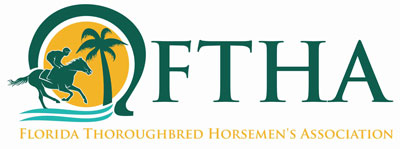On July 1, 2015 various provisions of Florida House Bill 239 relating to medication and testing of racing animals becomes law. This bill was signed by Florida Governor Rick Scott early this month after passing the House of Representatives 112-0 and the Senate 40-0. The passage of this bill now puts Florida, once nationally called the “obstructionist state,” on the path to joining the National Uniform Medication Program.
Two important medication statutes were abolished by this bill. The first one to be deleted from the statutes is the race day administration of Prednisolone known as Solu-Delta-Cortef. On July 1, 2015, you will no longer be permitted to administer this medication to your horse on race day. Florida was the only state with a race day medication statute that permitted another medication other than Lasix to be administered four hours prior to racing.
The second deleted statute abolishes the use of Thin Layer Chromatography (TLC) for testing samples that contained ARCI Class IV and V therapeutic medications. We wrote this statute in 1996 and it worked well for 19 years. TLC testing is a long established testing methodology, but it tests for a broad spectrum of therapeutic medications, and because it is not highly sensitive it established a threshold (its limit of detection) for the over 200 medications in Class IV and V. Most of these medications were administered at 24 hours prior to post time, because, for the most part, they couldn’t be detected by TLC with that withdrawal time. On July 1, 2015, these TLC established thresholds will no longer exist.
Now don’t be alarmed that over 200 medications can no longer be used as the vast majority of these medications are never used in the horse. What I am going to do is give you a list of the Class IV and V medications that you can continue to use, if necessary, in your horse just as you have for the last three years or longer. Nothing has changed. They are phenylbutazone (Bute), flunixin (Banamine, Ketoprofen, Isoxsuprine, Methocarbamol (Robaxin), Naproxen (Equiproxen), DMSO and Guaifenesin (Gecolate).
The following are ARCI Class IV and V therapeutic medications that no longer have the 24 hour withdrawal time formerly established by TLC testing. That means the Florida Racing Laboratory can call them positive at any level they desire or at their Limit of Detection (LOD) which you may recognize as “Zero Tolerance” testing. They are:
Aminocaproic acid (Amicar)
Bethaethasone (Betasone)________7 days
Dantrolene (Dantrium)___________2 days
Dexamethasone (Azium)__________3 days
Diclofenac (Voltaren)
Dipyrone (Novin)
Firocoxib______________________14 days
Fluoroprednisolone (Predef-2X)
Ibuprofen (Motrin)
Isoflupredone (Predef)____________7 days
Meclofenamic acid (Arquel)
Methylprednisolone (Medrol)______7 days
Prednisolone (Solu-Delta-Cortef)____48 hours
Triamcinolone (Vetalog)___________7 days
Trichlormethiazide (Naquazone)
Above you will find the withdrawal times for those medications found in the Controlled Therapeutic Medication Schedule which the Florida Division of Pari-Mutuel Wagering has until January 1, 2016 to adopt. As of July 1st, there are no thresholds for these medications.
There may be other medications that should be on this list. Veterinarians and trainers that may be using other Class IV or V medications need to come to the FHBPA offices to confirm that the medications they are concerned about actually fall into one of these two classifications. You will need the actual drug name to look it up. Over 700 substances are listed by ARCI that are not a Class IV or V substances. The Controlled Therapeutic Medication Schedule that established 26 thresholds and withdrawal times found in this bill doesn’t go into effect until the Florida Division of Pari-Mutuel Wagering is ready to implement it by rule.
The Division has already turned down a phase-in period with only warnings for positives for the above medications.
954.457.3516 | info@floridahorsemen.org



